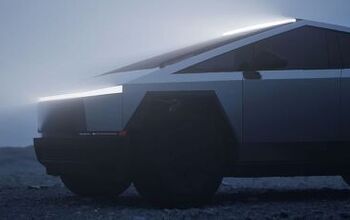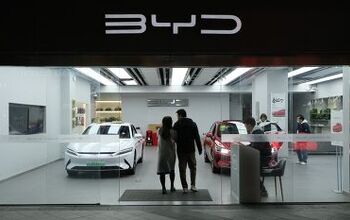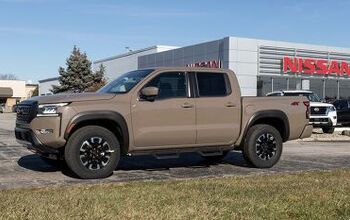Mazda’s Electric MX-30 Being Pulled From the U.S. Market

The Mazda MX-30 EV will be pulled from the U.S. market after 2023, with the manufacturer stating its preference to prioritize hybrid models. While the small crossover will live on in other parts of the world with a rotary range extender, mimicking what BMW did with the i3 with some Mazda-specific flair, the company’s first all-electric vehicle seems to have been a flop in North America.
Let’s be objective. The MX-30 EV (not to be confused with the CX-30) was always a compliance automobile. The vehicle comes with a laughably short range of 100 miles and was sold exclusively in California with sales volumes that can only be described as abysmal. Mazda sold just 181 examples of the MX-30s in 2021 and another 324 in 2022. It wasn’t a popular model and that fact doesn’t appear to be changing in 2023.
We’ve seen other brands field models with a similar trajectory before and undoubtedly will again in a bid to comply with escalating CAFE standards.
Other markets received MX-30s equipped with a 2.0-liter e-Skyactiv motor (mild hybrid) and the company debuted a plug-in hybrid with the aforementioned range extender in January of 2023. While there’s a chance the United States might someday see those versions go on sale, we recommend holding your breath. The rotary assisted PHEV doesn’t seem to be any faster and boasts an even smaller battery good for about 50 miles.
While the range extender is supposed to make that a non issue for the MX-30, the concept hasn’t resonated with American consumers — who seem to prefer traditional hybrids to EVs boasting gasoline-powered generators.
All of the above reminds us of the Fiat 500e, which the late Sergio Marchionne confessed existed solely to satisfy emission regulations. He even went so far as to request consumers not purchase the vehicle due to the fact that Fiat Chrysler Automobiles lost money on every transaction.
But the model is going back on sale in the U.S. under the Stellantis banner, with improvements to its range the company believes will make it more desirable. This may also be what’s in store for the MX-30. However, Fiat’s new leadership seems supremely interested in EV sales whereas Mazda appears to be a company that’s only doing electrification out of obligation. The Japanese brand has always seemed more interested in squeezing every drop it could out of small combustion engines than diving into battery power.
At any rate, Mazda does seem keen to offer more hybrids and has said that will be key to its current production strategy. Leadership has even suggested the MX-30 may return to our market in hybrid guise. But nothing other than the EV variant’s demise has been made official thus far.
[Images: Mazda]
Become a TTAC insider. Get the latest news, features, TTAC takes, and everything else that gets to the truth about cars first by subscribing to our newsletter.

A staunch consumer advocate tracking industry trends and regulation. Before joining TTAC, Matt spent a decade working for marketing and research firms based in NYC. Clients included several of the world’s largest automakers, global tire brands, and aftermarket part suppliers. Dissatisfied with the corporate world and resentful of having to wear suits everyday, he pivoted to writing about cars. Since then, that man has become an ardent supporter of the right-to-repair movement, been interviewed on the auto industry by national radio broadcasts, driven more rental cars than anyone ever should, participated in amateur rallying events, and received the requisite minimum training as sanctioned by the SCCA. Handy with a wrench, Matt grew up surrounded by Detroit auto workers and managed to get a pizza delivery job before he was legally eligible. He later found himself driving box trucks through Manhattan, guaranteeing future sympathy for actual truckers. He continues to conduct research pertaining to the automotive sector as an independent contractor and has since moved back to his native Michigan, closer to where the cars are born. A contrarian, Matt claims to prefer understeer — stating that front and all-wheel drive vehicles cater best to his driving style.
More by Matt Posky
Latest Car Reviews
Read moreLatest Product Reviews
Read moreRecent Comments
- Varezhka I have still yet to see a Malibu on the road that didn't have a rental sticker. So yeah, GM probably lost money on every one they sold but kept it to boost their CAFE numbers.I'm personally happy that I no longer have to dread being "upgraded" to a Maxima or a Malibu anymore. And thankfully Altima is also on its way out.
- Tassos Under incompetent, affirmative action hire Mary Barra, GM has been shooting itself in the foot on a daily basis.Whether the Malibu cancellation has been one of these shootings is NOT obvious at all.GM should be run as a PROFITABLE BUSINESS and NOT as an outfit that satisfies everybody and his mother in law's pet preferences.IF the Malibu was UNPROFITABLE, it SHOULD be canceled.More generally, if its SEGMENT is Unprofitable, and HALF the makers cancel their midsize sedans, not only will it lead to the SURVIVAL OF THE FITTEST ones, but the survivors will obviously be more profitable if the LOSERS were kept being produced and the SMALL PIE of midsize sedans would yield slim pickings for every participant.SO NO, I APPROVE of the demise of the unprofitable Malibu, and hope Nissan does the same to the Altima, Hyundai with the SOnata, Mazda with the Mazda 6, and as many others as it takes to make the REMAINING players, like the Excellent, sporty Accord and the Bulletproof Reliable, cheap to maintain CAMRY, more profitable and affordable.
- GregLocock Car companies can only really sell cars that people who are new car buyers will pay a profitable price for. As it turns out fewer and fewer new car buyers want sedans. Large sedans can be nice to drive, certainly, but the number of new car buyers (the only ones that matter in this discussion) are prepared to sacrifice steering and handling for more obvious things like passenger and cargo space, or even some attempt at off roading. We know US new car buyers don't really care about handling because they fell for FWD in large cars.
- Slavuta Why is everybody sweating? Like sedans? - go buy one. Better - 2. Let CRV/RAV rust on the dealer lot. I have 3 sedans on the driveway. My neighbor - 2. Neighbors on each of our other side - 8 SUVs.
- Theflyersfan With sedans, especially, I wonder how many of those sales are to rental fleets. With the exception of the Civic and Accord, there are still rows of sedans mixed in with the RAV4s at every airport rental lot. I doubt the breakdown in sales is publicly published, so who knows... GM isn't out of the sedan business - Cadillac exists and I can't believe I'm typing this but they are actually decent - and I think they are making a huge mistake, especially if there's an extended oil price hike (cough...Iran...cough) and people want smaller and hybrids. But if one is only tied to the quarterly shareholder reports and not trends and the big picture, bad decisions like this get made.





































Comments
Join the conversation
They're just following Toyota's lead in inching away from plug-in anything. This country is too big, and most people travel too many miles, for the urban plug-in to be a success outside of congested cities like Boston/NYC.
The market outside of those dense urban zones is much bigger (and potentially more profitable) and gas/electric hybrids make more sense. If they're not selling enough plug-ins to move the CAFE needle, more Gas/electric hybrids will.
Matt Posky hit the nail on the head: the plug-in is a CAFE compliance vehicle, and it didn't sell enough to do the job. Technically, so are the gas/electric hybrids, but they're cheaper to make and easier to sell in volume at a profit. Look for more automakers selling in the US to do the same.
I disagree with the idea that the MX-30 is a compliance vehicle. There wasn't enough production allocation to make a real difference in CAFE or emissions scores. I look at it as a real-world test platform. Its lack of sales is not really an issue for Mazda at this point. However, Mazda had better put the research to good use, because if the US government continues to follow Europe's central-planning industrial policy, gasoline engines will be stamped out within about 10 years.